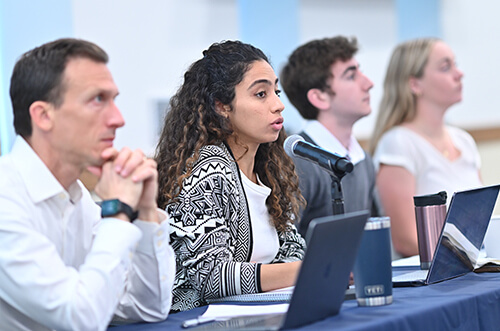
What arguments do China and the US employ to accuse each other of discrimination? And what can they tell us about race, human rights, and great power relations more generally?
These are questions that lie at the heart of one project pursued by the International Race and Rights Lab, led by Zoltán Búzás, associate professor of global affairs at the Keough School with support from the Klau Institute for Civil and Human Rights. Búzás and his team of student research assistants have been probing Chinese media to tease out how race and human rights are used to try to shape opinion. The team recently shared its initial findings at the Keough School.
Integrating disciplines
Búzás began by setting the stage from both an historical and theoretical perspective. “One interesting thing during and after the Black Lives Matter protests,” he began, “is that China frequently criticized the US for discriminating against African Americans. The reason that was interesting, at least for the casual observer, is that China is not known for being the champion of human rights. It is usually on the receiving end of human rights criticism. And yet Chinese media daily published articles criticizing serious domestic US racial discrimination.”
"We want to bring research in great power politics, and human rights and race, into conversation with each other."
Seeking to tie attitudes toward race and human rights to a larger conversation about geopolitical power, Búzás noted that existing research fails to make the connections. “Studies of great power politics do a great job emphasizing and engaging with aspects of economic competition and the military dimensions of great power competition. Studies of human rights and race offer great theoretical resources to understand that civil rights are not domestically confined. These two bodies of work are impressive individually, but they have not talked much to each other. We want to bring research in great power politics, and human rights and race, into conversation with each other.”
Research reveals rhetorical trends

The lab’s approach is to study China’s criticism of the US record on race and human rights by examining English-language Chinese media, which in theory would be the most widely distributed and consumed. The team coded 800 articles according to a variety of criteria, making sure to have two sets of eyes on each piece. Ultimately, the goal is to get a sense of how Chinese media – which, given the political realities in that country necessarily reflect the official state line – are used to shape a broader international conversation around US hegemony.
Preliminary findings reveal interesting patterns. Researcher Nourhan Fahmy, master of global affairs student at the Keough School, noted that much of the rhetoric avoids direct discussion of human rights and focuses directly on racial injustice. “Sometimes Chinese criticism is connected to human rights, but that’s in the minority of cases. Sometimes it’s connected to the global order or the United Nations. The Chinese media does so to contrast US rhetoric with its own actions, presenting the US as the leading voice in upholding global human rights and contrasting it with its own actions domestically.”
The trend is confirmed by looking at Chinese media quotes from US citizens. “If you look at criticism based on direct quotes of American citizens, in a lot of cases it was about police brutality or specific instances of racism in the US,” noted Matthew Ruff, a political science major and member of the research team. This contrasted with a more general critique of official US policy. “If you look at the overall rhetorical trend, a lot of the criticism was directed at the US government for being hypocritical and trying to interfere in other countries’ affairs.”
"Legitimacy is especially important for great powers who compete for primacy because it allows them an additional form of resource to influence international rules and institutions."
The research also revealed how race and racial justice are tied to broader questions about US legitimacy. This was especially true with regard to social problems exacerbated by the pandemic, noted Abby Lamm, a global affairs and political science student researcher. “Especially in 2020, as poor handling of the pandemic increased, we saw accusations of racism and racial inequality that focused on anti-Asian discrimination as well, in addition to Black Lives Matter,” Lamm observed. “We saw general criticisms of racial inequality tied to the pandemic, and how that had broader implications for economic inequality.”
Competing for political legitimacy
Examining Chinese accusations that the US is racist is only one side of the conversation. Next, the lab's research project will look at how the US criticizes China's mistreatment of the Uyghur minority. Examining Sino-American mutual accusations of racism promises a more comprehensive understanding of how great powers employ racial appeals to gain advantage in the contest for global primacy. “Our main conceptual move is to cast mutual criticisms of racism as legitimation struggles,” Búzás said. “The underlying idea is that great power competition is not just about economic and military competition, important as those are. It's also about legitimacy. Legitimacy is especially important for great powers who compete for primacy because it allows them an additional form of resource to influence international rules and institutions.”
More information on the lab, research team, and current projects can be found at the Klau Institute here.